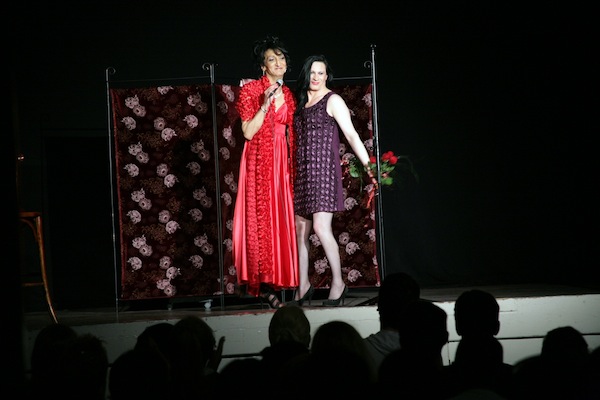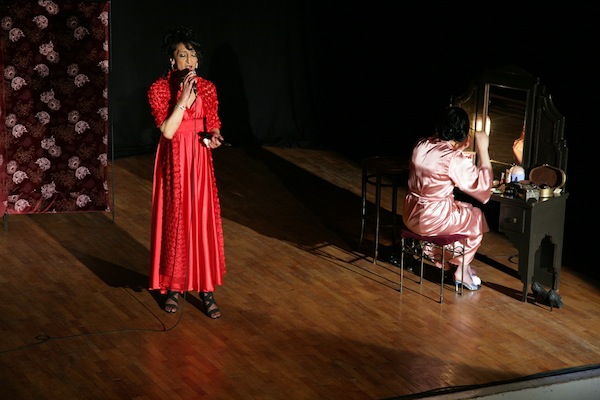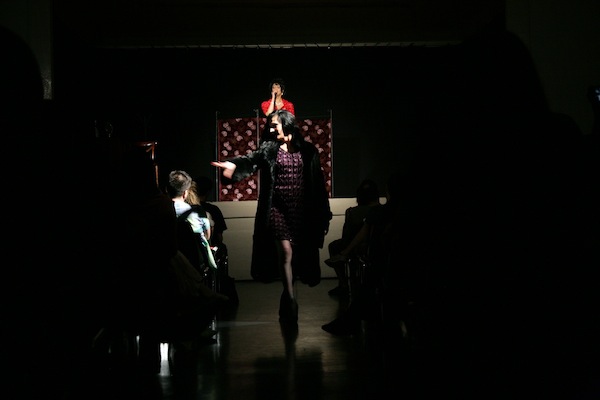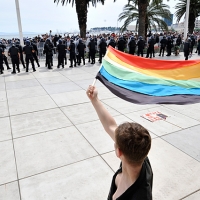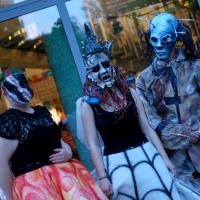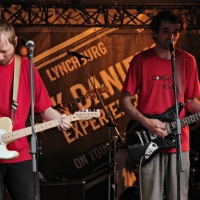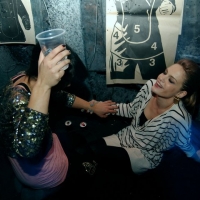Serbian transsexual prostitutes offer a peek into their lives on the Belgrade streets and the violent sexual abuse they suffer from the police. And they do it in a killer on-stage performance
Last week, in a theater in central Belgrade, crowds gathered to watch a cabaret entitled “Behind the Mirror”, a performance starring two transsexual sex workers. With its sparse, seductive stage design, the cabaret’s props include little more than a plush maroon folding screen, a Victorian-style mirrored vanity desk, and a bottle of cheap brandy. The setting looks like a shadowy, old-fashioned brothel, and the props (or lack thereof) communicate a sense of isolation, and the social desolation of these lives.
The project was initiated by the sex workers themselves: fed up with regular beat downs and coerced sex by Belgrade cops, near constant harassment, and general isolation from the rest of Serbian society, a small group of transsexual women decided that they wanted a platform to tell their own stories. After being put in contact with a team of Belgrade artists, the team created a choreographed performance, documentary photo series, and documentary film. Finally, the project evolved into a cabaret.
The sex workers’ stories are told through song and monologue, and reveal a slice of Belgrade life that is rarely, if ever, discussed. One particularly striking moment involves one of the performers describing her encounters with policemen. She explains how she and other transsexual sex workers are regularly beaten, demeaned, and threatened with arrest, physical assault, or fines if they refuse to have sex with policemen. For the cops, this type of sexual extortion seems to serve as a form of moral punishment.
A recent joint study conducted by the University of London and the University of Belgrade entitled “Police violence and sexual risk among female and transvestite sex workers in Serbia”, describes multiple instances of sexual brutality perpetrated by police, who operate with total impunity in Serbia’s famously homophobic society.
As one Roma transsexual who took part in the study told the researchers, “They want blow jobs, fucking, if you want them to let you go. You’ve got to. The police like fucking us more than anyone. They don’t pay. It’s like this: they fuck us, and so they let us go.”
And another police story, from a different transsexual woman: “He wants me to blow him for free. I don’t want to. Later, when he gets me on my shift, he beats me silly. Beats me silly.”
As one performer in “Behind the Mirror” says of the police, “I don’t know how anyone can feel safe around them”.
While the cabaret does devote time to these important, if devastating details, it also includes ample messages of empowerment, especially in love.
One performer sings the altered lyrics of a song whose original oozed with the typical Mediterranean machismo of “you’re a woman who knows how to wait for her beloved man”, turning it into the proud refrain, “I’m not a woman that would ever wait for a man”. And so the cabaret was also about self-love. One of the best moments of the show was when one of the performers stepped off the stage to affectionately squeeze the hands of people in the audience.
At the end of the performance, these women, typically relegated to the furthest margins of society, received a standing ovation, because what was revealed during the show, in addition to the rare insights into their lives, was that they were ballsy superstars, and well deserving of the audience’s showering of love, red roses, and applause.
The audience’s open adoration for the performers in “Behind the Mirror” evoked memories of another transvestite sex worker from Belgrade who achieved a certain level of fame and public fascination during the worst years of the 1990s. Merlinka, for whom the annual Queer Film Festival is now named, starred in several films, including 1995’s Marble Ass, which went on to win best feature at the Berlin Film Festival. Despite her obvious deviation from traditional Balkan masculinity (which went on steroids in a major way during the war years), she was popular, and some Belgrade residents remember that she was always greeted fondly inside Kalemegdan fortress, where she was often found feeding stray dogs.
Merlinka was murdered by her lover in her own apartment in 2003. Before she died, she told a neighbor, “I’m sick of wandering the streets and living like a dog.”
In a country famous for its intolerance towards sexual minorities, where pride parades prompt football hooligans blessed by Orthodox priests to take to the streets to kill gay people and their friends, the warm reception of “Behind the Mirror” is no small achievement. Even more remarkable, however, was that the troupe behind the performance, and the performers themselves, managed to assemble something so potent, something that rendered invisible lives so visible.

